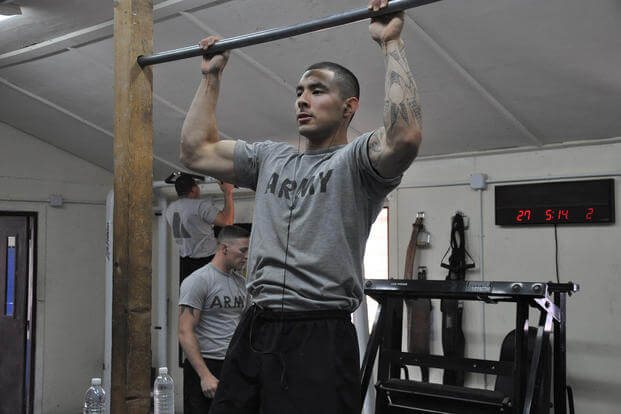For people who are seeking training programs for special-ops selections, there is no 30-minute workout that will prepare you for a day of special-ops training. Whether you are a full-time student, student-athlete or full-time worker, there are only a few hours in your long day in which you can fit in a challenging workout. For most people, splitting it up into sections (two-a-days) may make more sense.
Below is a recommended way to train for the different types of special-ops candidates that exist:
1. Full-Time Student
Whether in high school or college, most days allow for sufficient time to study and train physically. However, depending on the time of year, you may find that stress increases and time management goes out the window. Many find that an early morning cardio workout is a good way to wake up. Depending on your branch of service and access to facilities, you may be able to swim, and you always can run or ruck.
Getting into an early morning exercise habit is not a bad idea; morning PT is a part of life in many military training programs. Plus, the discipline of early morning workouts tends to promote an earlier bedtime. A workout after dinner also is a great way to wake up for a long night of work or study.
2. Full-Time Student-Athlete
As a student-athlete, you have the above issues, plus the added time commitment of practices, games and travel. This can eat up your training days in preparation for special-ops training, but depending upon the sport, you may have 50% to 75% of your daily training done. You certainly will have the teamwork requirement taken care of, which is important because it matters whether you are a good team player when going through training.
As a student-athlete, you have to focus on your weaknesses when you can. For instance, if you are a football player, you likely have the strength, power and speed/agility covered, but you should spend some time working on swimming skills/techniques if you seek a water-borne, special-ops program.
This will be about all you can do during the season, but during the offseason, you can work on running more miles, swimming more with and without fins, or rucking, along with higher-repetition calisthenics mixed into your offseason program. But as a student-athlete, let the trainers show you how to mix future requirements into your day.
Even if it is just adding pull-ups or a long run per week, it will help. Once you are done with football or your other sport, you can focus on special-ops preparation. I have seen lineman in the 280- to 300-pound range drop 60-80 pounds to become ready for SEALs, PJ, Rangers and USMC training in six months.
3. Full-Time Student with Part-Time Job
Consider the student with a part-time job similar to the above two types, only if it involves physical labor. If you are at a desk job or a late-night workplace, you may find that the work is physically easy, but takes away significant training, study or sleep hours. If you are on your feet, lifting equipment, and moving nonstop, that is actually a great preparation for a day of special-ops training.
If you can fit in an early morning workout, maybe a run or swim at lunch, and an evening lift or PT, combined with your hours of school and physical labor job, that is about as close to a special-ops day of training as you can create for yourself.
In a day of special-ops training, you likely will start off with a workout. You will be on your feet the rest of the day, either doing some form of physical workout or labor, or learning how to use equipment and weapons in a classroom setting. Either way, you will not have time to nap. That is right; there are no naps at training.
However, in your preparation for such training, it is fine to take a catnap if you have a long day or night ahead of you, and you need a nap to avoid overtraining and lack of recovery issues.
4. Full-Time Job
The full-time job also depends upon what type of job. If in an office, you have to add physically challenging periods to your day. You may have to use the weekends as the days you crush longer runs, swims or rucks.
I have enjoyed working out at least an hour before work, sometimes up to two hours depending on the season (longer days in the summer), then working/school time followed by whatever I need to work on the most (weakness related to future training -- strength, endurance, timed cardio events, high-rep calisthenics tests, etc.)
5. Full-Time Job (Spouse/Family)
Doing all the above with a job and family is tough but possible. One way many do it is that they get most of their work or workouts done while the children are napping, sleeping or at school. Consider playtime with the kids a way to de-stress and provide a break for your spouse.
You always can get in calisthenics exercises while with the kids at the playground, or put your kids on your back and do push-ups. Get a running stroller and push the kids while you run or ruck. I always liked passing people running while pushing a baby wearing a backpack. Make it fun motivation for yourself.
Sometimes, life, school and work can get in the way of a longer workout per day. Be creative and smart about your training, focus on your weaknesses and maintain your strengths. During crazy hectic times, you may have only 30-45 minutes to train or completely miss a few days a week of training.
This is fine, so do not beat yourself up about it, but do not let it happen often. The best cure for a highly stressful time is an easy cardio event like running, swimming, or biking, where you focus on deep breathing and relaxing.
Recovery Is Critical
One of the most important things you cannot neglect is your health and physical recovery. As you "burn the candle at both ends," you may find that missing sleep, stress, sports or other injuries, and neglecting your nutrition will cause you not to recover optimally. Your schedule could worsen and have you start to exhibit overtraining symptoms, including illness, lack of motivation, grumpiness, negative performance gains, loss of muscle mass, loss of appetite and more.
See links for more tips:
Stew Smith is a former Navy SEAL and fitness author certified as a Strength and Conditioning Specialist (CSCS) with the National Strength and Conditioning Association. Visit his Fitness eBook store if you're looking to start a workout program to create a healthy lifestyle. Send your fitness questions to stew@stewsmith.com.
Want to Learn More About Military Life?
Whether you're thinking of joining the military, looking for fitness and basic training tips, or keeping up with military life and benefits, Military.com has you covered. Subscribe to Military.com to have military news, updates and resources delivered directly to your inbox.




















